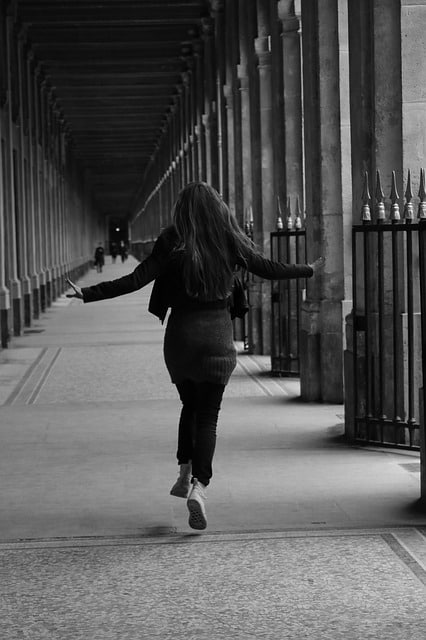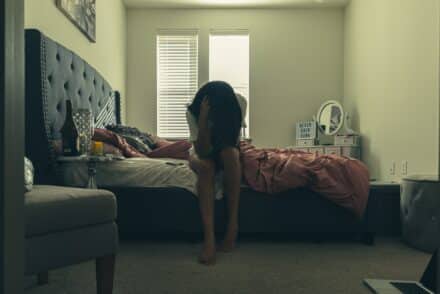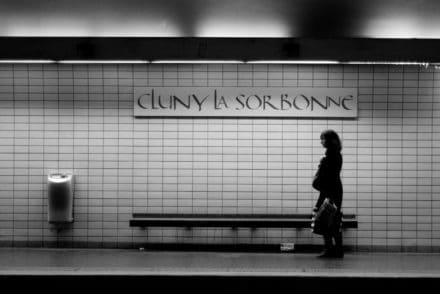Note from Jen Pastiloff, founder of The Manifest-Station. This is part of our Young Voices Series for Girl Power: You Are Enough. We are always looking for more writing from YOU! Make sure you follow us on instagram at @GirlPowerYouAreEnough and on Facebook here.
By Meghan O’Dea
For a brief period in my mid-twenties, I worked in an office in the middle floor of what had once been Chattanooga, Tennessee’s grandest department store. It had mostly been renovated into a hip, loft-vibe open office space full of glass and saturated off-primary paint colors, but my favorite part of the whole outfit was the old bridal salon in the far back corner of the building. The plasterwork was crumbling, revealing the lathe beneath, and the pieces that still clung to the studs and timber were covered in beautiful white and silver mylar wallpaper. Huge plaster cornices crowned the ceiling, and slender, simply ornamented columns held up the floors above, converted to expensive condominiums. I loved to stand amid the dirt and debris on the scarred hardwood floors, imagining away the old pool table and cardboard boxes and discarded desks and imagine the space in its heyday, full of chiffon and satin and tulle, the women walking away with candy-striped hat boxes and the sent of lilac and lavender in the air.
It was, by some metrics, the best job I’d ever had. I loved to get dressed in the morning and feel that I was putting on work clothes not just because it was required, but because the position deserved sleek pencil skirts and smart blouses. I loved to hear my high heels clicking on the marble lobby floor in the morning, and that I was able to take an elevator up to my floor. It was the soft echo of affirmation. Finally, there was the morning latte and the after-work martini, the downtown job. I took my credit cards out of my wallet and put them in my underwear drawer. I had managed to purchase a house the summer before, and now I actually felt I could afford it.
Working downtown meant that I could do without the car. The house was just a couple miles from the office, and the bus stopped at a dry cleaner’s a few blocks from my front porch. I donated the little blue Honda to NPR, because it wasn’t worth enough to sell, because it seemed like the right thing to do. Each morning I boarded the Number Four with women uniformed for their own downtown jobs selling chicken salad sandwiches or cleaning floors or minding parking lots. There were men in construction uniforms or torn track pants, mothers minding quiet, wide-eyed toddlers, tired retirees making their way to the one grocery store downtown. The bus dropped me off in front of a coffee shop. It picked me up in front of the Electric Power Board headquarters, across from the park where men sat with bottles in brown paper bags. At the bus stop, women in house shoes sat anxiously holding the paperwork for their power bills.
I spent my days in a palace of commerce, typing on a computer given to me by the company, making calls on the cellphone they paid for, and on my breaks I would wander back to the old bridal salon and think of crinolines and lace, the trappings of cotillions and monied matches. I’d been single for two years, and I was getting used to telling myself this was my choice, that I was a career kind of girl. I was proud that I’d bought the house on my own, that I no longer had to negotiate to get my electricity turned back on, as I had during a particularly desperate summer of freelancing. I’d been broke, but I’d never been poor, just as by some metrics I’ve made it, and yet had always felt so far behind, just as I was single, but insisted I was not lonely.
❦
A few months before I turned eighteen, after I had dropped out of prep school, after I’d gone to live at the hippie commune, I had the opportunity to join some of my new friends on an expedition to Virginia to protest the logging of a beloved knob. We drove up I-75 listening to the Grateful Dead and Fugazi and a few days later settled in to the Clinch River watershed to stage a tree-sit. At Forest Action Camp I was introduced to a group of crusty punks from Asheville, who had dropped out of the mainstream to hop trains, squat in houses and dumpster dive. One girl, called Wren, had beautifully embroidered her black, thrifted clothes with patches from Southern punk bands and little birds, like her name. One side of her head was shaved, and she wore combat boots with a ripped black skirt. She and her friends worked only when they wanted to, or needed to, and traveled seasonally with their dogs, going everywhere from Philadelphia to Mexico. I’d read On the Road, but this was a whole new level of stepping away from the status quo. I’d never known anyone before who was voluntarily homeless, who was so utterly disconnected.
The Free Lance-Star sent out a reporter to interview the activists who’d convened from near and far, from organizations as diverse as Katuah Earth First! and the Ruffled Grouse Society. One declared to the paper that he would put his life on the line, if necessary. I met a group of other women for a female-only climbing clinic that morning, before the reporter came down the hill to speak with us. Later, I found myself in print, suggesting that “The government could make more money from supporting recreation in the forest.” I was described as “18 year old Meghan O’Dea…dangling from a poplar tree in her climber’s harness.” My economic expertise was as limited as one might expected of a middle-class high school drop out who had fled prep school to protest capitalism in rural Appalachia, whose education in finance consisted of receiving paychecks from a suburban movie theater and skimming The Communist Manifesto.
Back then I wanted to be Julia Butterfly Hill, Alanis Morrisette, choosing to skip the career versus motherhood dichotomy for something grander, political, subversive. I wanted to commit to a cause, to intellect, to art. I cut my hair short at sixteen because I didn’t want to risk be beautiful, I wanted to be noticed for everything just under the surface. I wore board shorts and baggie concert t-shirts. I annoyed everyone I knew with my knowledge of which gas stations were owned by liberal corporations that donated their money to blue causes. I didn’t want a life in the sense of hanging out in parking lots furtively smoking menthols, or driving cars around to try and crush garbage in a parking lot with the right front tire, or drinking under age in the dorm rooms of college boys, but I did want a political life, because a political life meant I mattered. It meant I was working for something. It seemed equally likely that I could end the Iraq War as get a date, but at least this was a process that involved my wits, that expanded beyond the limits of my hometown. There was a moral righteousness to it, a whiff of the adult. There was an access to office supplies that turned me on more than the free condoms my friends and I picked up from pride parades. A man could change my life, but I could change the world.
❦
After I started taking the bus to work, I started meeting the women with nowhere to go. They didn’t ask for help like the panhandlers and drifters and alcoholics, or with the practiced nonchalance of the chronically homeless. They couldn’t make eye contact, kept their eyes on the ground. They rarely had a bag or a purse, or even a sweater. They had runny noses and eyes red with crying. They didn’t know the ropes of the local tent cities, or where the homeless shelters were. I’d wait at the bus stop with them, pulling up the numbers of the women’s only safe houses, of the churches that offered a hot meal, with addresses and what bus routes would take you there. I drew maps on the back of receipts. Once, I offered up my own phone number.
The Number Four rolled up and took me back to my house, where I changed into my pajamas and pourer boxed wine into a mason jar and flicked on the TV. I waited for the phone to ring. I cooked dinner from my CSA vegetables, keeping an eye on the screen I’d set within arm’s reach on the counter. I went to bed. I lay there and wondered what my strategy would be. What place would I go to stay safe if I had run out of options? Would I hop a train? Sleep under an overpass? How different would it be than all those years ago when I’d spent the summer in a one-man tent on the side of a mountain, than when I’d shared a grilled roadkill beaver with the crusty punks by a campfire, than when I’d gone dumpster diving with my mother on a lark?
❦
I remember the month we ran out of money in the ninth grade. I was about to purchase a pair of pants online when my mother told me my allowance would have to wait. Everything would, in fact. She went to the grocery store, bought enough food to last for the next three weeks, and that was it. We weren’t going to spend a penny more except on gas. Somehow, my parents had done the math wrong. Depending on how you looked at it, they’d done the math wrong ever since they decided to send me to private schools we couldn’t quite afford. It’s also subjective whether the math was right or wrong on their decision to have only one child, in order to allow for all the other calculations that followed, financial, emotional, familial. Either way, it was the first time I fully felt the difference between my family and those of my classmates, who lived in pricier zip codes, whose parents drove SUVs, who had siblings spread out across different grades of the same expensive schools.
❦
A few years after I left the palace of commerce for good and started freelancing, a girl I’d gone to high school with, who had been a few years ahead of me in school, started living in one of the apartments in that same once-upon-a-time department store. I recognized the shape of the windows from her photos online, as she documented a rapid meeting and marriage to an entrepreneur, the renovation of the home her parents had bought her to share with her first husband, the birth of her first child. She talked about the bar down the street and overhearing the noises of all those late night revelers outside the cozy confines of her marriage bed, baby within arm’s reach. The bar where I, too, once had more than a few beers most nights after work, where I wrote furiously for the paper documenting the ins and outs of twenty something life, where I could keep an eye on the bus stop across the street to make sure I caught the last one home.
“As I try to fall asleep,” she wrote alongside a photo of her new, bonneted baby, “I think ‘I used to be out there.’ And ‘out there’ means so much.” She recalls the scraped, neon nights chasing gas station closing times to score one last six-pack, and now she stands inside the safe and comfortable walls of a marriage, no longer outside on the street sick and sore. It means many different things to me, this idea of who is inside and outside a marriage and motherhood, of who fits in and who doesn’t, of who is on the street and who is out of their minds. It is so loaded, this thing, this sentence, this attempt to position a life lived adjacent to an old bridal salon a few floors up from a palace of commerce. To understand what it is to be there, in the apartment bought with the money her father made made from decades of selling new cars. To have grown up eating the pot likker greens invented by this place’s poor, and to make them still in kitchens rimmed with marble countertops.
I thought back to those afternoons watching bands of sunlight strike the dust motes back in that old bridal salon, standing amidst the corporate detritus, the leavings of capitalism, the cast off keyboards and cardboard boxes and USB keys. I thought about how happiness is an accident. It is not something I could walk into like a marble lobby, or purchase on sale for free shipping with a few clicks of a mouse. It is not something that comes wrapped in tulle and taffeta, glittering like rose gold. It is also a fallacy to thing one can find it by eschewing all that, that it exists for enlightened vagabonds in out of the axel grease corners, in the underbrush at twilight, in tent cities where want has created a moral superiority. I didn’t earn this happiness. It is not a place to arrive, as I so often thought.
For all I grew up on the promise of a room of one’s own, of my own economic potential, I discovered I could access the space, could earn the money, and yet be left twirling in the empty spaces voided by dreams deferred. I was haunted by the old rotunda at my high school, a place imbued with the inheritance of old Southern values, with a belief in a certain kind of womanhood. I felt myself still as a bird in the poplar tree where I could have sacrificed myself to beautiful impossibilities. I was possessed by those bus stops, rife with uncertain evenings looming in front of scared women whose lives are both like and unlike my own, separated by scant chances, yes, but also a string of choices made by men and women long before us. I still stood in that palace of commerce, dreaming two dreams, the old and the new, hers and mine. I found myself standing in uncharted territory, trying to learn to make space for all that I am.
Meghan O’Dea is a writer, editor and reluctant Southerner crafting a life in the foothills of Appalachia. She earned a masters in Creative Nonfiction at the University of Tennessee at Chattanooga. When she isn’t writing she’s hiking, drinking craft beer, and hanging out with two little black cats.

Join Jen Pastiloff at her signature workshop in Atlanta at Form Yoga on Aug 26 by clicking the picture.






No Comments